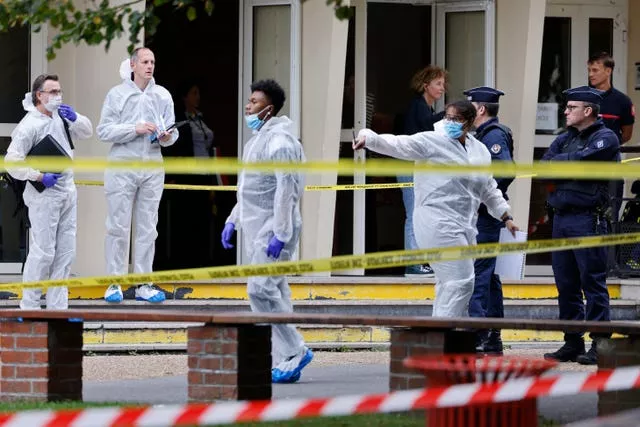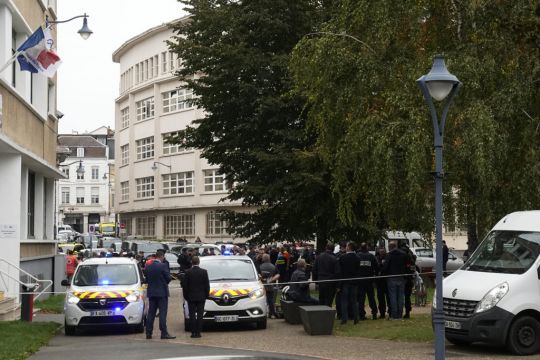France’s interior minister has said the suspect in a deadly school stabbing had been detained for questioning the day before on suspicion of radicalism, but investigators found no weapon or threat or indication that he was preparing an attack.
Interior minister Gerald Darmanin said on TF1 television that intelligence services had been monitoring the man’s phone calls for several days and so sought to question him.
“There was a race against the clock. But there was no threat, no weapon, no indication. We did our our job seriously,″ he said.
A man of Chechen origin who was born in 2003 was arrested on Friday after a teacher was stabbed to death at the combined middle and high school in the city of Arras. Three other people were wounded.
French security services had been monitoring the man, who was a former pupil at the Gambetta-Carnot high school, since the summer over suspected Islamic radicalisation.
The suspect was reportedly refusing to speak to investigators. Police said the suspect’s younger brother was held for questioning.
President Emmanuel Macron said France had been “hit once again by the barbarity of Islamist terrorism”.
Earlier, France’s national counterterrorism prosecutor has said that several people have now been detained in an investigation into a school stabbing that left one teacher dead and three people wounded.

Prosecutor Jean-Francois Ricard said the wounded include a teacher, a security agent and a cleaning worker.
He said “several people are in custody” along with the main suspect but did not give details.
He identified the attacker as Mohammed M.
A colleague and a fellow teacher identified the dead teacher as Dominique Bernard, a French language teacher at the Gambetta-Carnot high school.
The attack happened almost three years after another teacher, Samuel Paty, was beheaded by a radicalised Chechen near a Paris area school.
Sliman Hamzi, a police officer who was one of the first on the scene, said the suspected attacker, a former student at the school, shouted “Allahu akbar,” or “God is great” in Arabic.
Mr Hamzi said he was alerted by another officer, rushed to the school and saw a male victim lying on the ground outside the school and the attacker being taken away. He said the victim had his throat slit.

“I’m extremely shocked by what I saw,” the officer said. “It was a horrible thing to see this poor man who was killed on the job by a lunatic.”
Mr Macron travelled to Arras along with the interior and education ministers. He stopped for a moment before the blanket-covered body of the teacher, which was in the parking lot in front of the school.
The president then went to see students from the school in an adjacent building.
He said police thwarted an “attempted attack” in another region of France after the teacher’s fatal stabbing.
He did not provide details, but police said a man armed with a knife was arrested coming out of a prayer hall in the Yvelines region west of Paris. The man’s motives were not immediately clear, police said.
School attacks are rare in France, and the government asked authorities to heighten vigilance at all schools across the country. The government also increased its threat alert level on Friday, allowing for larger police and military deployments to protect the country.
Mr Darmanin said there was no specific threat that prompted the move to a higher security posture, but “an extremely negative atmosphere” notably because of calls by extremists to attack amid the Mideast war.
He said authorities have detained 12 people near schools or places of worship since the Hamas attack on Israel last Saturday, some of whom were armed and were preparing to attack.
France has heightened security at hundreds of Jewish sites around the country this week.
Julie Duhamel, an official with the the Unsa teachers’ union in the Pas-de-Calais region that includes Arras, told radio network Franceinfo that teachers had flagged the suspect’s radicalisation “a few years ago”.
The suspect’s telephone conversations in recent days gave no indication of an impending attack, leading intelligence officers to conclude that the assailant decided suddenly on Friday to act, intelligence services told the AP.
An older brother was arrested in the summer of 2019 by the DGSI – France’s counter-terrorism intelligence service – on suspicion of being involved in the planning of an attack that was thwarted, and is in jail, French intelligence said.
The older brother also was a former pupil at the high school targeted Friday, according to legal records from his trial earlier this year on terror-related charges.

Investigation records show that during a school class in 2016 about freedom of expression, the older brother defended a terror attack in 2015 that killed 12 cartoonists at the French satirical newspaper Charlie Hebdo.
The older brother is serving a five-year prison term for terror offences.
He was convicted this year of involvement in a plot for an armed attack around the presidential Elysee Palace in Paris that was thwarted by the intelligence services. Other members of the radical Islamist group were also jailed for up to 15 years. He was the group’s only Chechen.
Friday’s attack came amid heightened tensions around the world over Hamas’ attack on southern Israel and Israel’s blistering military response, which have killed hundreds of civilians on both sides.
Mr Darmanin on Thursday ordered local authorities to ban all pro-Palestinian demonstrations amid a rise in antisemitic acts.
France is estimated to have the world’s third-largest Jewish population after Israel and the US, as well as the largest Muslim population in Western Europe.
A moment of silence was held at the opening of a France-Netherlands soccer match Friday night to honour the dead teacher. France’s National Assembly, the lower house of Parliament, held a minute’s silence for the victims at the opening of its Friday session.
Mr Macron said the school in Arras would reopen as soon as Saturday morning, and he urged the people of France to “stay united”.
“The choice has been made not to give in to terror,” he said. “We must not let anything divide us, and we must remember that schools and the transmission of knowledge are at the heart of this fight against ignorance.”







